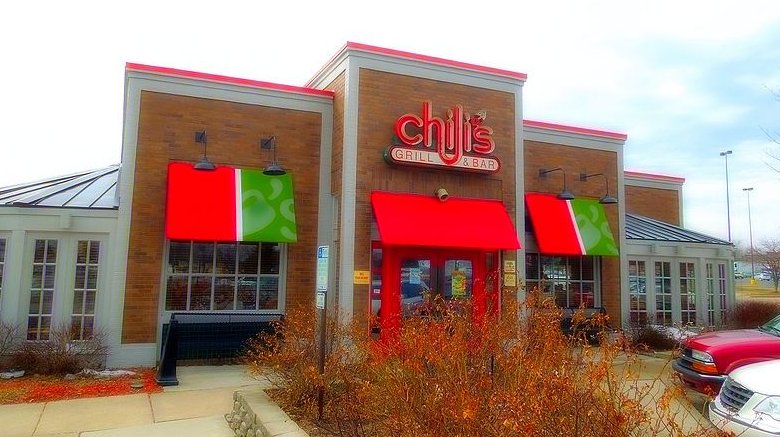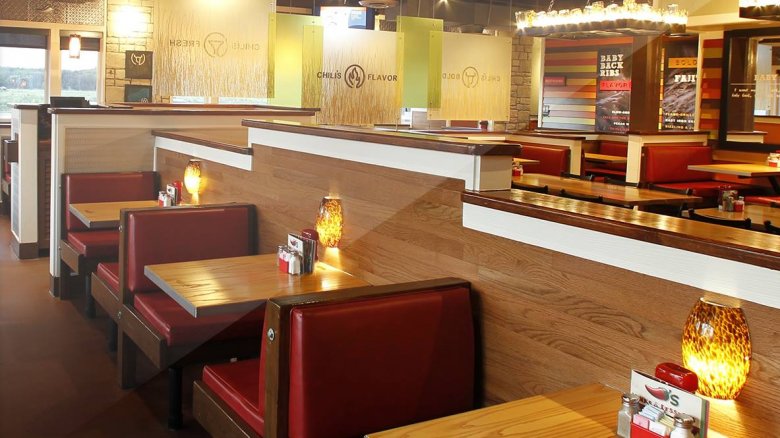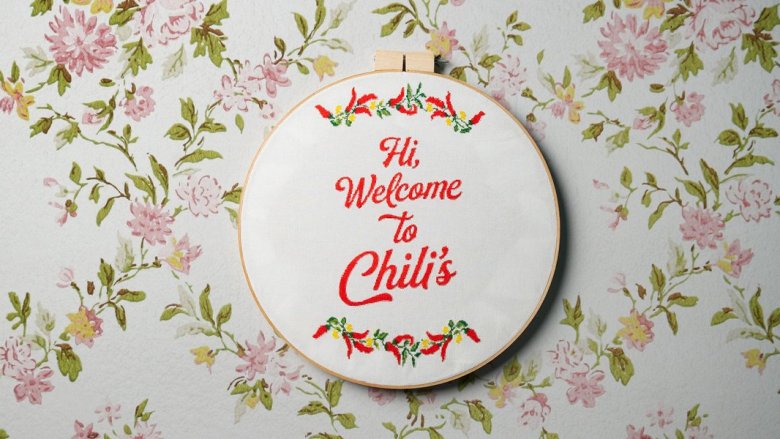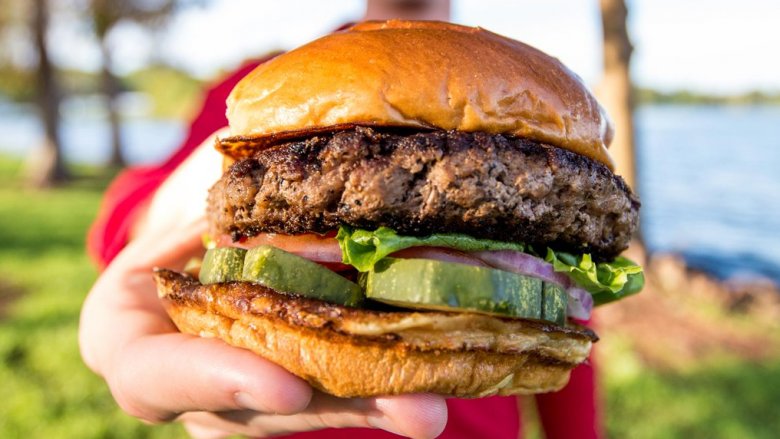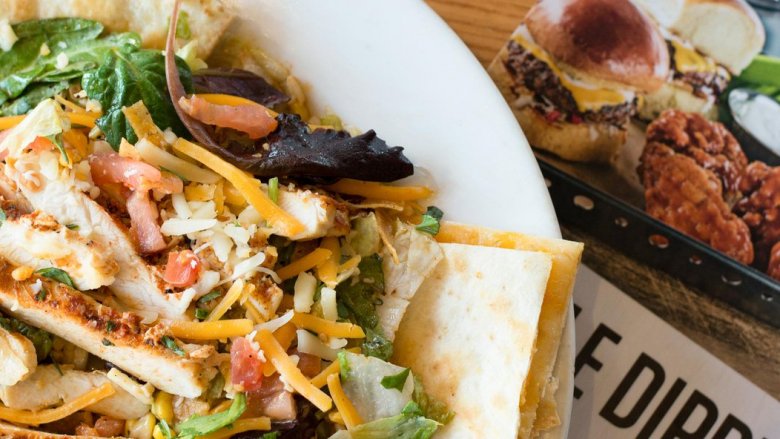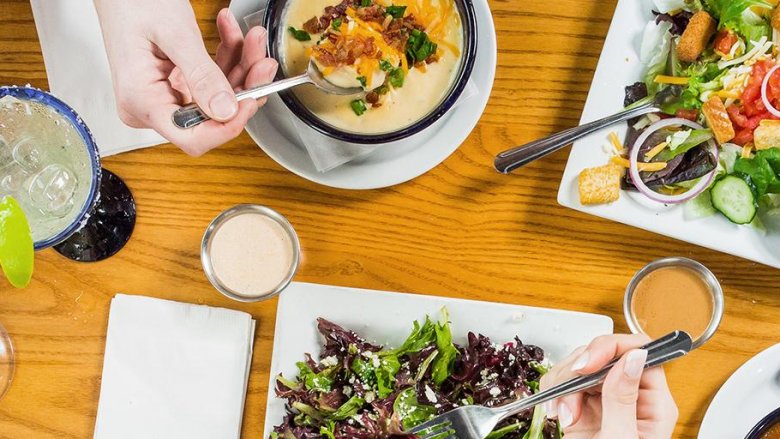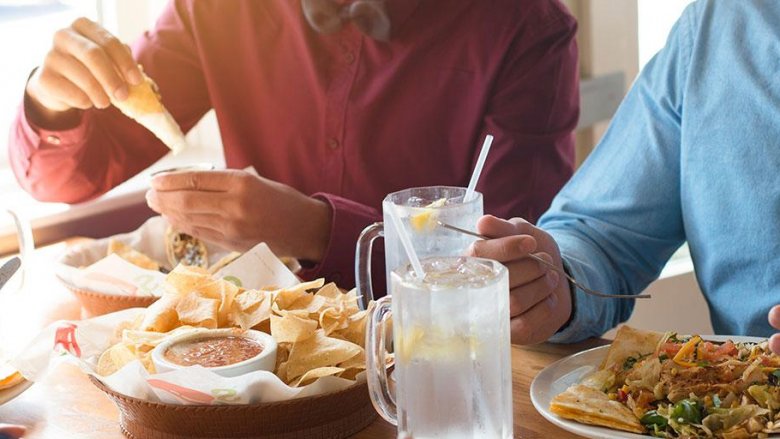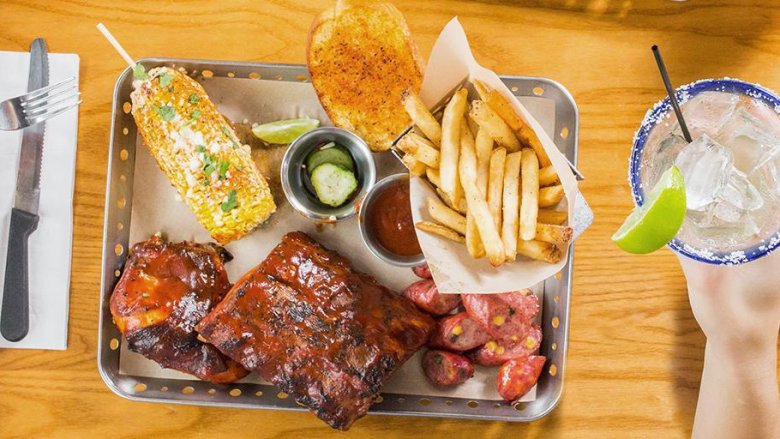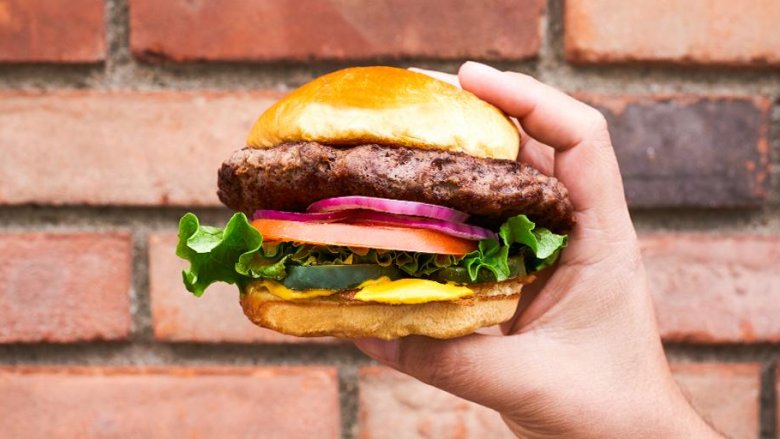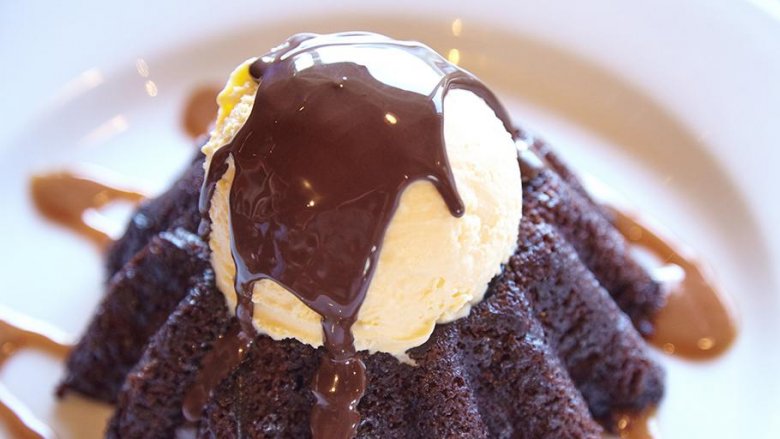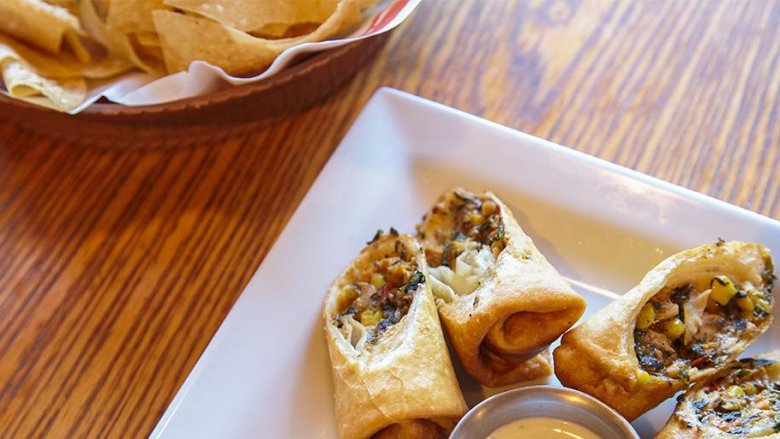The Real Reason Chili's Is Struggling
Out of all the popular American bar and grill chains, perhaps Chili's is the one with the most noticeable presence in our cultural zeitgeist. The "Baby Back Ribs" jingle was so ubiquitous in the early 21st century, even boy band N*SYNC grabbed a piece of the action. The burger and ribs joint was also known as being the favorite rendezvous point for everyone's not-so-favorite boss Michael Scott from The Office.
But even with as many pop culture references Chili's Grill & Bar has under its belt, the company finds itself at an impasse. While the restaurant is still one of the most frequented chains of its type, boasting locations that span all 50 states and 32 countries, there's no denying that bar and grill chains in the United States are losing favor with consumers.
While Chili's has seen some up-kick in numbers since drastically paring down their menu and focusing on improving product quality, that bounce back only happened after store traffic declined 4.4 percent in Q2 2018. In the fickle restaurant market where chains can go from popular to non-existent in less than a decade, experts have their doubts regarding whether or not Chili's will ever see the market domination it once had. Their menu changes might have helped, but there are a lot of reasons Chili's is still struggling.
Millennials are killing casual dining
Casual dining establishments like Chili's are among the plethora of things millennials are straight up killing. While the headlines are fun to joke about, it's worth considering how much the Y Generation can impact a market. Pew Research reports that millennials — those born in the 1980s and 1990s — are set to overtake the baby boomers as the largest generation by 2019. So all jokes about the "killing" power of millennials aside, where these adults choose to spend their money will continue to impact the economy going forward. There's no denying it.
A big misconception about millennials is that they simply don't spend money. In truth, millennials are very liberal with their spending. Compared to both their boomer and Gen X peers, millennials are happy to part with their money for luxuries like ride share services, the latest gadget, going to a live event, and even going out to eat. Millennials may have grown up eating at places like Chili's, but they're all grown up now, and they're not making the same choices as their parents. If Chili's wants to catch some of those dollars young people are happy to spend, they need avoid gimmicks like cauliflower, and instead tap into the things millennials actually care about, like convenience and technology.
They lost touch with their weirder roots
According to parent company, Brinker's, history of Chili's, the story of the bar and grill began in 1967 when founder Larry Lavine attended the Terlingua Chili Cook-off hosted in the West Texas town. The cook-off was actually hosted by Lavine's father-and-law — and famous race car driver — Carroll Shelby. Lavine has such a blast at Terlingua, he was inspired to open up a restaurant that captured the jovial spirit and bold flavors of a chili cook-off.
When fast-casual sales began to slump in the 2010s, Chili's tried to win back millennial diners by adding trendy ingredients and making their food more "Instagrammable," and such marketing efforts swiftly fell flat. Meanwhile, the birthplace of Chili's, Terlingua, has become a hip "glamping" destination for young travelers exploring the West Texas desert. As for the Terlingua Chili Cook-off, what was once a small gathering for desert people who like to burn their tongues has become such an authority on the cuisine Esquire does write-ups of its winners. Rather than trying too hard to win young diners, Chili's needs to tap into its weird desert past and access that bohemian party spirit people love about Terlingua.
Casual dining restaurants are flailing
Market trends change every year, but one thing we've seen pretty consistently the past decade is the declining popularity of casual dining chain restaurants. Two big reasons for this? Over expansion and even more competition. Between 2006 and 2014, restaurants were opening at an alarming rate — faster than the population of the United States was growing, according to The Wall Street Journal. This was bad not only for the existing restaurants, who now had more competition, but also for the new locations, which didn't have many hungry customers to choose from. Although the growth has slowed, many of the excess restaurants still remain, making it harder to make a profit.
Add to that the growing popularity of quick service chains like Chipotle and Five Guys, offering food that's fast, lower-priced, and just as tasty, and casual dining spots like Chili's are in big trouble. Unless restaurants like Chili's find a way to stand out in the over-retailed marketplace, they'll only see declining traffic and sales with each new competitor that rears its head.
They betrayed customers' confidence with a data breach
People who choose to get dinner at Chili's typically do so with the idea in their head that it's a "safe" choice. You know what the food is going to be like, how the atmosphere will feel, etc... But that safety came into question in 2018 when customers learned of a data breach that leaked debit and credit card information. Furthermore, while the breach reportedly happened between March and April of that year, the company didn't announce the incident until May 12, while additionally failing to immediately provide information regarding which locations were affected.
Security breaches have made big headlines in recent years as companies appear to play it fast and loose with their clients' information. In a market where consumers have more choices than money to spend, knowing a company takes their personal security seriously is a selling point. If Chili's wants to gain back the loyalties of patrons, they need to be more proactive with data confidentiality.
Environmental sustainability isn't a priority
The 2018 Special Report on Global Warming released by the United Nations' Intergovernmental Panel on Climate Change (IPCC) has spurred consumer interests in sustainability as the agency calls for "rapid, far-reaching and unprecedented changes in all aspects of society" to prevent the negative consequences of atmospheric warming. With that in mind, eating out in restaurants feels more wasteful than ever. From the excessive plastic used in to-go orders, to food waste, people who want to maintain greener lifestyles find it difficult to justify heading out to eat for dinner. According to the National Restaurant Association's State of Restaurant Sustainability 2018 report (via SmartBrief), modern consumers take sustainability practices into account when it comes to choosing where they dine. The NRA report claims customers factor in a restaurant's work to reduce food waste as well as their recycling and food donation programs into their decision making process.
Chili's already made strides in 2016 when they committed to source sustainable seafood certified against the Global Aquaculture Alliance Best Aquaculture Practices (BAP). If they really want to appeal to consumers though, they should lean even more into sustainable practices like switching to compostable materials for to-go orders and reducing food waste through prevention, recovery, and recycling methods. Not only would these ideas generate loyalty among existing customers while creating new opportunities for marketing to new ones, sustainability saves businesses money. It's a win-win for everyone.
They suffered a social media disaster
Jhordi Henderson and his friends' poor customer experience at Chili's went from bad to worse very quickly. According to Henderson, the problems started inside when their server told them she was not in a good mood due to a long shift. After some issues with their orders, Henderson's group only spoke with a manager when the server refused them a to-go cup for a child's lemonade because there was alcohol at the table. After closing, the patrons sat outside talking and catching up with each other when the police showed up and said the manager wanted them to leave.
Luckily, no charges were pressed. But when a video went viral showing the interaction, people questioned why the manager felt it was necessary to call the cops rather than asking the customers to leave the property first. Chili's promptly responded with a statement where they said the guests declined the opportunity to discuss their experience with the higher ups at the company, insinuating that everyone involved wanted to move on from the incident.
Whether this was a case of discrimination or simply an employee making a poor decision is up for debate. However, identity politics in the United States are growing increasingly divisive and many people see the use of non-emergency 911 calls by businesses as a means to misuse police as agents of discrimination. With the 2018 incident, Chili's is unfortunately among the list of companies associated with this practice at the moment, something that may keep some customers from walking through their doors.
A location was caught with a *very* dirty kitchen
No matter the demographic — young or old, black or white, poor or rich — nobody likes the idea of eating in an establishment with a dirty kitchen. However, in September 2018 a Chili's franchise in Winter Haven, FL had to shut down after health inspectors found live roaches in the kitchen. News reports stated that inspectors issued a total of 15 violations for issues including the accumulation of old food debris in microwaves, ceiling tiles leaking rainwater, limescale in the dishwasher, and yes, dead roaches on a plate stored next to the salad bins.
Consumers have their choice of dining establishments to choose from so even one report of uncleanliness at a location can turn a patron off a place for the long-term. While the incident only applies to one out of the hundreds of Chili's locations in the country, the wide reach of digital news means people can make the "Chili's = dirty kitchen" connection even if their local franchise isn't in the wrong. Beyond any crisis marketing management the restaurant could implement, Chili's Grill & Bar simply has to wait for the incident to fade from people's memories to recover.
"Locavores" don't want to buy what Chili's is selling
What are "locavores?" This trendy portmanteau refers to people who commit to eating food that is locally raised, grown, and harvested. People embrace this way of life for a few reasons. First, eating food that is locally produced is good for the environment. Locally produced items are more often organically grown and ethically raised. Furthermore, buying food that comes from one's own area means it was never shipped over long distances, conserving fuel and cutting down on greenhouse gas emissions.
Chili's Grill & Bar did well cutting down on the amount of menu items they offer. People go to the chain with their favorites in mind, not to get adventurous with their meal choices. However, Chili's can improve upon their classic dishes by incorporating more locally-sourced ingredients into their menus as a way to appeal to consumers who want to be more ecologically minded and support local farmers and ranchers. Sourcing local foods isn't the easiest endeavor, but it would definitely help Chili's stand out in their market while appealing to a demographic that wrote off the restaurant long ago.
They were too slow to make changes
In the popular restaurant game, if you snooze, you lose. Chili's learned that lesson the hard way by waiting too long to implement changes that could've helped business. As Sarah Halzack at the Washington Post points out, competitors Olive Garden simplified their menu all the way back in 2014 and Ruby Tuesday did the same in 2016 when they cut 30 percent of their dishes. Meanwhile, it took Chili's until 2017 to do the same and catch up with the market trend. Considering the successful results, it's quite obvious that making changes sooner may have made a bigger impact.
While American fast-casual restaurants are struggling across the board, Chili's Grill & Bar has the history and brand recognition to make it out alive. However, they can't rely on these things alone. If they want to stand out as an industry leader, they have to be ahead of market trends, not lagging behind.
They ruined the Triple Dipper
Okay, so this one is personal and addressing it may not be the secret to reversing the struggle, but the Triple Dipper has always been the best appetizer on the Chili's menu. However, sometime in the past decade they changed the options one could include with their Triple Dipper order, eliminating Skillet Queso and White Spinach Queso as possible choices.
Now diners have to choose between nine different types of chicken, Southwestern Eggrolls, Awesome Blossom Petals, Fried Pickles, Crispy Cheddar Bites, and Big Mouth Bites sliders. You don't even dip sliders! Why are they on an option called the Triple Dipper? While we are at it, when exactly did Wisconsin-style Crispy Cheddar Bites replace Mozzarella Sticks? Finally, you're not fooling anyone, Chili's. We all know "White Spinach Queso" is just good old spinach dip. You don't have to try and trick us into thinking it's some specialty Mexican dish with rebranding. Nobody is coming to Chili's expecting cultural cohesiveness. We just want our fried foods and the yummy sauces in which we may dip them.
